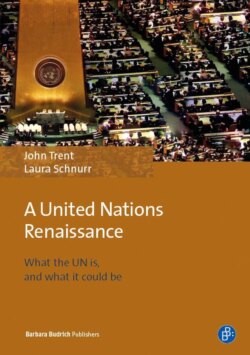Читать книгу A United Nations Renaissance - John E. Trent - Страница 8
На сайте Литреса книга снята с продажи.
[15] The global governance deficit
ОглавлениеHow has the world changed since 1945? Has it changed to a degree which requires us to transform the international institutions that were created at that time? We argue that it indeed has. That our present challenges are as much global as they are national or local is a powerful rationale for improving our institutions, but it is not the only one.
The world is far more complex than it was during the post-war period. Some 51 countries came together to form the United Nations in 1945. Today, there are 193 member states. And great power politics have shifted tremendously since that era. Bipolar or unipolar global order has been replaced by one that is multipolar, with all that portends for instability.
When the UN was established, state governments were the dominant actors in the global sphere. While it may be too early to declare even the partial demise of the state-centric world, power is increasingly shared with other nonstate actors, such as NGOs, foundations, multinational corporations, religious communities, regional coalitions or blocs, intergovernmental organizations, and groups of major economies such as the G7 and G20.
Economic, social and cultural globalization has meant that we are more connected than ever. Greater ease of transportation has facilitated global trade of goods and services. The same is true of the movement of people, resulting in rising migration and international travel. Rapid and complex communications provide new sources of knowledge and instantaneous access to information. Most people’s lives have been affected by globalization in some way, but the extent varies significantly. And the gains from deeper integration have not been evenly spread; there are distinct winners and losers. Social and economic inequalities have reached new heights and capital is ever more concentrated in the hands of a few, with just one per cent of the world’s population controlling more than 50 per cent of the wealth. The global society we live in today is by no means a global community.
By contrast, international institutions and their capacity for governance have not changed substantively. Established in 1945, the United Nations was designed for a different era. Its institutional structure and culture still reflect this past era, rather than the realities of the 21st century. It has not kept pace with rapid globalization and change. This stunted institutional development has led to its marginalization, with states looking elsewhere to solve the world’s most pressing challenges. Observing this trend, many fear that the UN will slide into irrelevance unless it adapts to the times.
Sadly, at a time when we are in desperate need of greater cooperation and global governance, we are witnessing rising nationalism, xenophobia, and protectionism in many countries. Accelerated globalization and integration, which for decades were assumed to be unstoppable, are being met by a new wave of resistance; leaders and politicians favouring nationalism and isolationism over [16] multilateralism are gaining support. We saw this when voters in the United Kingdom opted to leave the European Union in June 2016, and again less than five months later when voters in the US elected Donald Trump as their next President. The rise of nationalist political movements, on both ends of the political spectrum but particularly on the far right, is undermining international institutions such as the UN.
